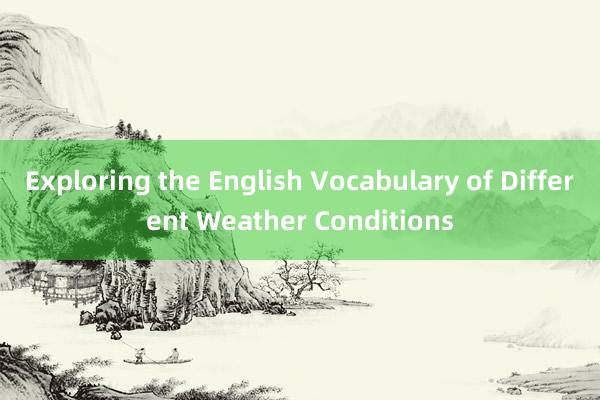
Title: Exploring the English Vocabulary of Different Weather Conditions
Weather is an integral part of our daily lives, influencing our activities and moods. Understanding the vocabulary associated with different weather conditions not only enhances communication but also helps in describing experiences more vividly. This article explores some key English terms related to various weather phenomena, providing a comprehensive guide to enrich your language skills.
Starting with sunny weather, the term "sunny" refers to clear skies and abundant sunshine. It contrasts with "cloudy," which describes skies covered by clouds, limiting the amount of sunlight reaching the ground. "Overcast" is another term used when the sky is completely covered by clouds, making it appear dull and gray.
Moving on to precipitation, "rain" is perhaps the most common form of water falling from the sky. The intensity can vary from light rain to heavy downpours, with "drizzle" being particularly gentle rain. On the other hand,合肥泵阀网_泵_阀门_制造供应泵阀门网 "thunderstorms" involve rain accompanied by lightning and thunder, 首页-新西乌颜料有限公司 often with strong winds. For those living in colder climates, 首页-盛 平玉锁具有限公司 "snow" is a significant weather phenomenon. Similar to rain, snow can be light or heavy,嘉兴市兴腾脚轮有限公司 with "flurries" indicating light snowfall that does not accumulate significantly.
企业愿景:成为较受信任的创新性企业服务开放平台When discussing temperature, "cold" and "hot" are straightforward descriptors. However, for more nuanced descriptions, terms like "chilly" (slightly cold) and "cool" (mildly cold) are useful. Similarly, "warm" and "mild" can describe less intense heat. "Freezing" specifically refers to temperatures at or below the freezing point of water, often associated with ice formation.
Lastly, we explore some less frequent but impactful weather conditions. "Fog" is a dense cloud close to the ground, reducing visibility significantly. "Haze" is similar but typically caused by air pollution rather than natural moisture. "Gale" and "storm" indicate very strong winds, while "hail" is a form of precipitation consisting of balls or irregular lumps of ice.
Understanding these terms enriches one's ability to describe weather accurately and poetically. Whether you're planning outdoor activities嘉兴市兴腾脚轮有限公司, writing a novel set in a particular climate, or simply engaging in everyday conversation, having a rich vocabulary for weather conditions can make your expressions more colorful and precise.